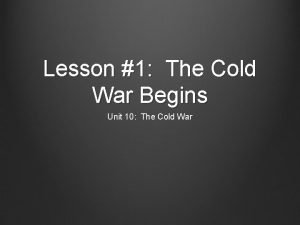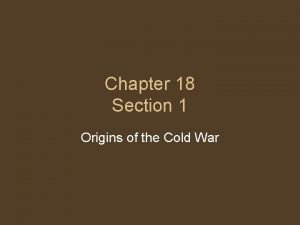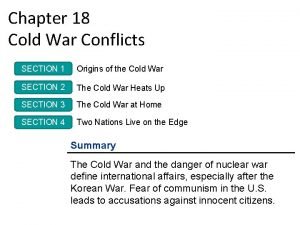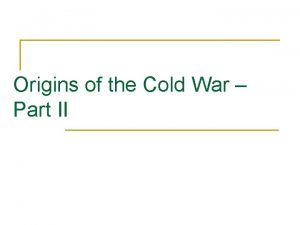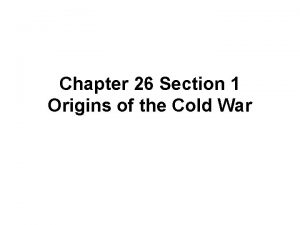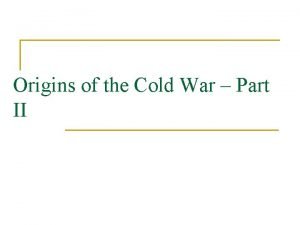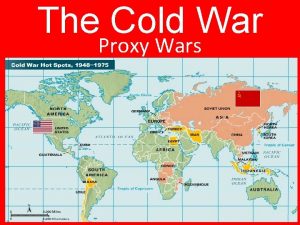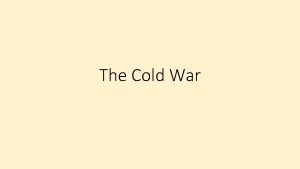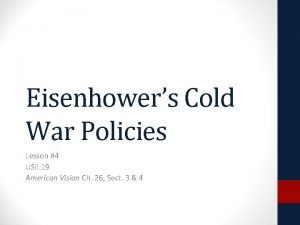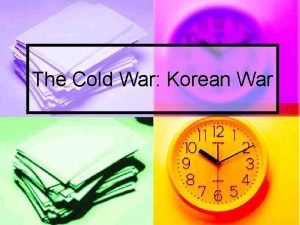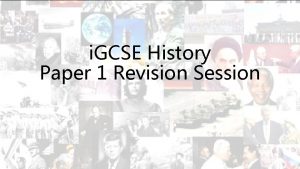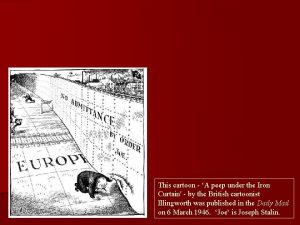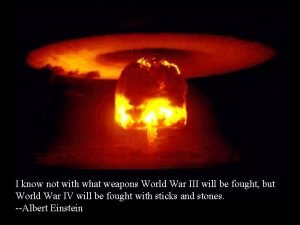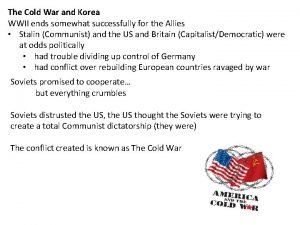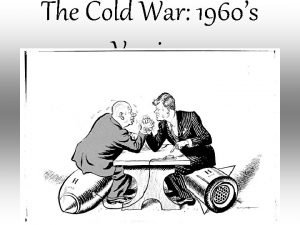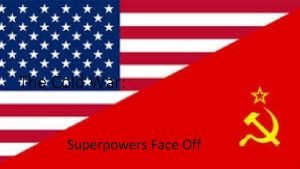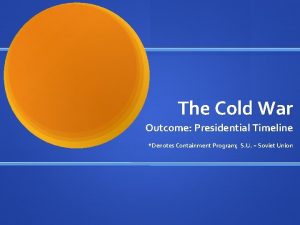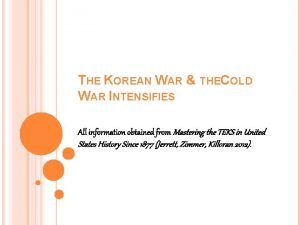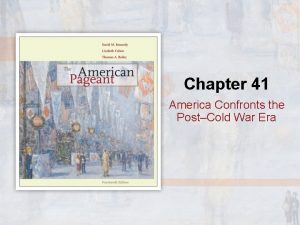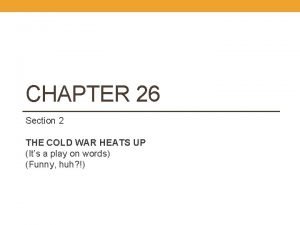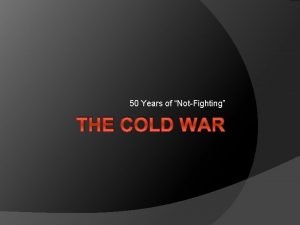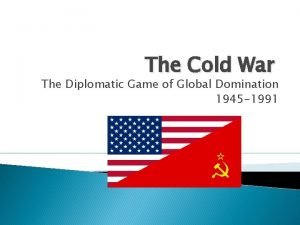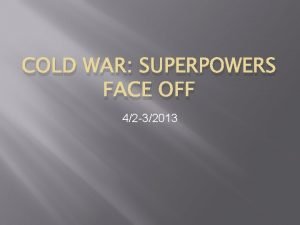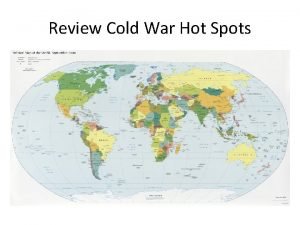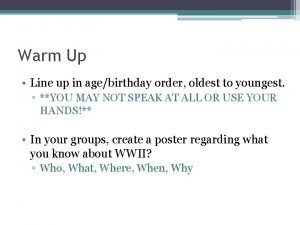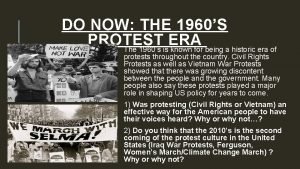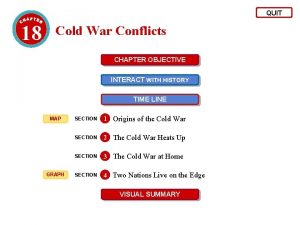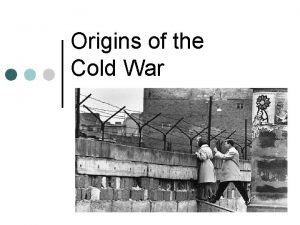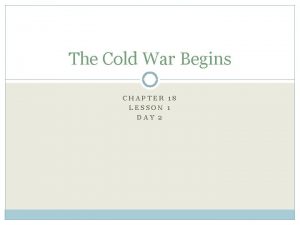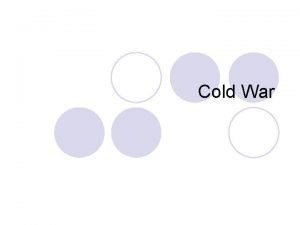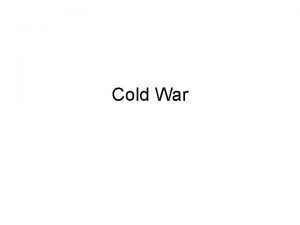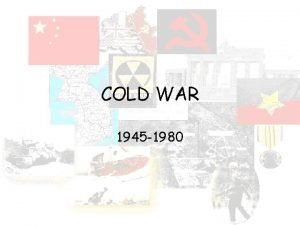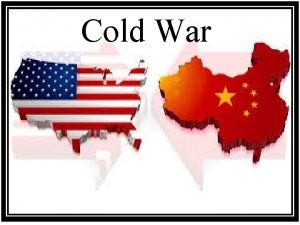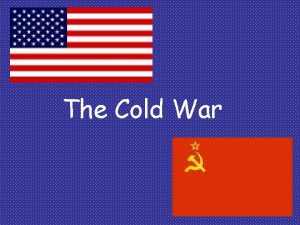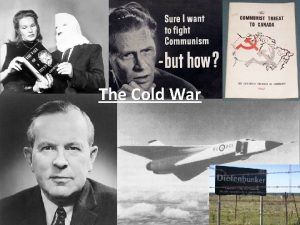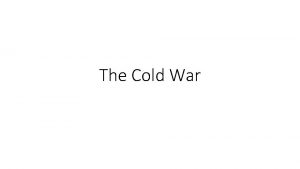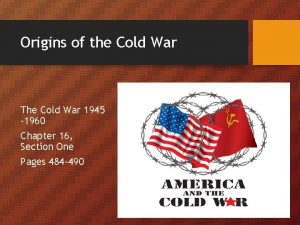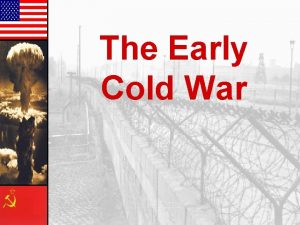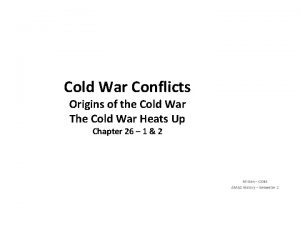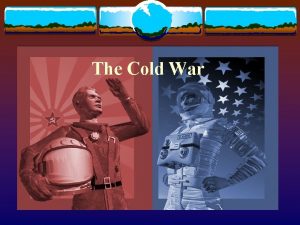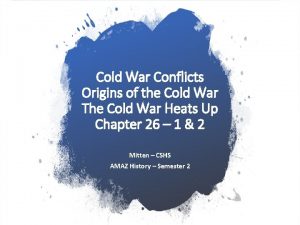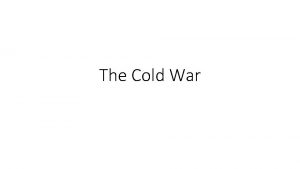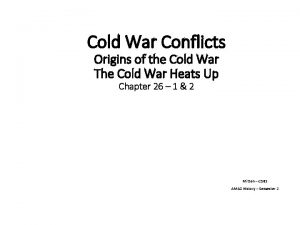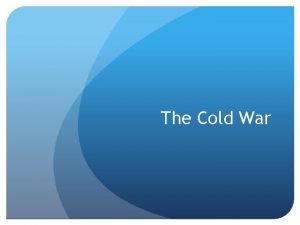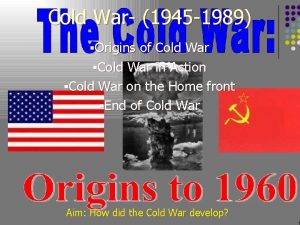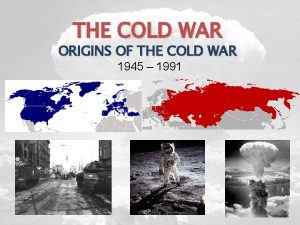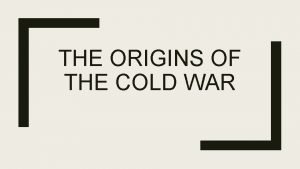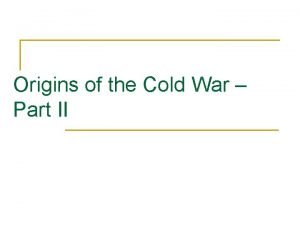The Cold War Origins of the Cold War































- Slides: 31

The Cold War

Origins of the Cold War � Period after WWII is referred to as the Cold War: the tense relationship between capitalism (mainly the USA) and communism (Soviet Union) � Postwar (after WWII) discussions were postponed as long as possible. • Western countries (mainly U. S. and Britain) were uneasy about Stalin’s postwar intentions. � Teheran conference (Nov. 1943): • Big Three: Roosevelt, Churchill, Stalin • Was decided that Soviet Union would solely deliver Eastern Europe from Germany. • Implications: Soviet Union had strong position in East, western powers had little to no input.

Flawed Victory � Yalta Conference (Feb. 1945): • Germany divided into zones of occupation: Soviets in East Germany, western countries in West Germany • Berlin, which fell in Soviet sector of Germany, was subdivided because it was the capital city • Germany forced to pay heavy war reparations to U. S. S. R. • Soviet Union declares war on Japan once Germany was defeated. � Before the Yalta Conference: • pro-Soviet groups were forming in eastern Europe. • Bulgaria and Poland controlled by communists. � Potsdam Conference (July 1945): • Roosevelt died, succeeded by Truman • Truman was driven to promote the democratic American ideal. He demanded free elections in the east. • Stalin would not allow this.

Awkwardness at Yalta

Division of Germany according to Yalta Conference

Division of Berlin According to Yalta Conference

West vs. East � Differences between nations were stalled during WWII; however, with Germany beaten, Western and Eastern politics and ideology clashed. � Stalin- a suspicious man • Believed free elections would lead to hostile govt. on western border (again) • Communist countries only dependable ally • “struggle against capitalist imperialism” � Truman- a decisive man • American democratic ideals at all-time high • Millions of eastern European voters in U. S. rallied for free elections in Soviet controlled areas • View towards Communism was containment: Communism cannot spread � Three main causes of Cold War: military developments, wartime agreements, and political/ideological differences

America “Gets Tough” � May 1945: U. S. cut off aid to U. S. S. R. � October 1945: U. S. announced it wouldn’t recognize any govt. established against the free will of the people � Communist agents subversively spread communism throughout Europe � America’s answer: containment • Truman Doctrine: military aid to counties fighting communism (Greece & Turkey) • Marshall Plan: Financial and economic aid to all Europe

�Stalin refused the Marshall Plan in Soviet occupied areas. �Communist government seized Czechoslovakia (Feb. 1948) �Berlin Airlift: U. S. S. R. blocked routes into Berlin from west. • Soviets continuously battered West Berliners with communist propaganda and rioted against anticommunist leaders. • Soviets stopped supplying West Berlin and cut electric power to non-Soviet zones. • Western powers began flying supplies into West Berlin. • Airlift lasted 324 days: Soviets backed off.

Berlin Airlift

New Alliances � 1949 North Atlantic Treaty Organization (NATO): Anti. Soviet military alliance between U. S. & several other countries. � Stalin focuses on his satellite countries and in 1955 formed the Warsaw Pact between the Soviet Union and eight other communist countries.

Communist Asia �Late 1949 China’s civil war is won by the communists. �Korean War • 1950 North Korean communist army invades South Korea. • U. S. fights with South Korea • China backs North Korea • Truman refuses to go to war against China; truce negotiated in 1953

Post WWII Economics & Politics � Economic conditions were worst in Germany • 13 million Germans forced from lands given to Poland • War reparations: factories were seized, equipment and materials were shipped back to Soviet Union • Western allies sometimes treated Germans harshly � The rest of Europe began to heal. Period of 1945 -1968 known as the Western Renaissance

Econ & Politics cont. � Christian Democrats • Out of the wreckage of WWII, new leaders were emerging. • Christian Democrats became leading political party. • Italy, France, and West Germany elected leaders from Christian Democrats. � Welfare measures throughout Europe • Free medical services, public housing, family allowances, nationalized industry. � Countries were willing to step outside the box • France: mixed state and private ownership of key industries. Also used national funds for industry. • West Germany: Embraced capitalism, reformed currency, abolished rationing & price controls.

European Unity � Organization of European Economic Cooperation (OEEC) • Created to help distribution of economic aid � Council of Europe (1949): dedicated to promote democratic ideals throughout Europe � European Economic Community (1957) • Known as the Common Market • Created by the Treaty of Rome • Due to resurgence of nationalism, countries stayed independent in the Common Market

Decolonization � Colonies fighting for self-determination and equality. � Moral views had shifted since 1914: Europe not interested in bloody colonization. � India: • British socialists not fan of imperialism • Financial burden for Britain � China: Civil war between Nationalists and Communists – communists headed by Mao Zedong. • Nationalists withdrew to Taiwan • China under Mao: forced labor camps, mass arrests, propaganda, kicked out foreigners.

� � � Middle East: Creation of Israel • Violence between Jewish and Arab populations intense in Palestine • 1947 United Nations voted to create Israel for Jewish pop. • Jews were happy, Arabs not happy = continual fighting Egypt: Nationalist revolution led by Gamal Abdel Nasser • Nationalized Suez Canal Company (which was foreign owned) Africa: • British colonies gained freedom, entered British Commonwealth of Nations • French colonies had choice of total break w/ France or enter commonwealth w/ France – All but one colony kept ties with France Economic ties increased because of this “neocolonialism” Neocolonialism: System used by Western powers to keep economic power under the disguise of independence

Soviet Eastern Europe � During WWII Russian nationalism grew • Russians expecting increased freedom after the war – they were wrong • Stalin again started to see capitalism as the enemy � 1930 s all over again • Purges, labor camps, massive propaganda, censorship, no possessions, no religion, secret police • Military industry was priority • Agriculture, consumer goods, and housing were ignored � Stalin’s main postwar goal was to spread his Stalinist system throughout Eastern Europe. � The only country that defied Stalin: Yugoslavia • Josip Broz Tito achieved independent communism in 1948

De-Stalinization 1953 -1964 � Stalin died March 5, 1953 � Nikita Khrushchev, reformer, came to power • Power of secret police was weakened and many labor • • camps were closed Resources shifted from military to consumer goods and agriculture Standard of living began to improve Foreign relations were relaxed Some eastern European countries rebelled (Why? ) � Literature and art emerged as a result • Pasernak’s Doctor Zhivago and Solzhenitsyn’s One Day in the Life of Ivan Denisovich

End of Reform � Khrushchev’s mistakes: • Ordered Western Powers out of West Berlin. When West refused, Khrushchev backed off (1958) • Berlin Wall (1961): Constructed to stop access to East and West Berlin • Cuban Missile Crisis (1962): Soviet missile base in Cuba � In 1964 Khrushchev was replaced by Leonid Brezhnev. � Re-Stalinization started, but on limited scale. • Party members saw de-Stalinization weakening authority of govt.

Invasion of Czechoslovakia � Stalinist leader replaced by Alexander Dubcek � Wanted socialism with personal freedom � Soviet leaders intimidated Czech govt. and U. S. S. R. invaded with 500, 000 troops � Reform in Czechoslovakia was over � Brezhnev Doctrine: Soviet Union and allies have right to intervene in any socialist country when needed. � Implication: Soviet Union was determined to keep dominance in Eastern Europe.

Social Transformations & Late Cold War

Science & Technology �Big Science: large-scale scientific projects funded by govt. and large corporations. �Space Race: • 1957 Soviets launched Sputnik I • 1961 Yuri Gagarin (Russian) first person to orbit Earth • 1962 John Glenn first American to orbit Earth • 1968 U. S. launched Apollo 8 • 1969 U. S. landed on moon

Sci & Tech cont. � Europe “brain drain”: govt. funded research attracted many European scientists. � In response, Europe pooled resources to begin projects.

Changing Class Structure �Technological and industrial expansion created need for management = middle class. �Middle class grew and diversified. �Lower class: farm work declined, no job opportunities for working class. �Women began to work “white-collar” jobs �Birthrate declined as women entered workforce.

Women’s Movement � Causes: Higher education, entering workforce, and American civil right movement. � Simone de Beauvoir: The Second Sex (1949) � Betty Friedan: The Feminine Mystique (1963) � 1966 National Organization for Women (NOW) • Fought for reforms in workplace and family matters

Counterculture �Economic prosperity, mass communication and the baby boom contributed to a radical new generation. �Sexual behaviors, living arrangements, drug use – experimentation �Higher education & romanticism �Rebelled against traditional views & “the establishment” �Student protests: against admin & govt.

Vietnam War � Reason: containment of communism � U. S. backed South Vietnam against Communist North Vietnam � Public bombarded with war daily � Anti-war protests � Johnson does not run in 1968, Richard Nixon elected (1968) � 1972 Nixon reached peace with N. Vietnam � Watergate: illegal activities by administration – Nixon resigned.

Détente or Cold War? � Détente: relaxation of Cold War tensions � Chancellor Brandt: • Wanted reconciliation with Eastern Europe • Treaties accepting existing boundaries negotiated with U. S. S. R. , Poland, & Czechoslovakia. � Final Act of Helsinki Conference 1975 • Declaration to improve relations between nations • Promoted political freedom and human rights • Soviet Union ignored many provisions � By the 80’s, détente was wavering

Economic Troubles � 1970’s: value of dollar dropped, high inflation � 1973 OPEC place oil embargo on U. S. for backing Israel. Oil prices quadrupled. � Misery Index: combined unemployment and inflation rates.

Troubles cont. � Optimism and romanticism of postwar gave way to pessimism and realism. � Welfare programs prevented a revisit to 1920’s. � Govt. forced to cut spending. • Scientific projects were one of the first to go. � Environmentalism: • Green party in Germany (1979) � Nutrition: awareness of responsibility oneself. � Starting families was postponed. for
 Lesson 1 the cold war begins
Lesson 1 the cold war begins Origins of the cold war chapter 18 section 1
Origins of the cold war chapter 18 section 1 Origins of the cold war chapter 18 section 1
Origins of the cold war chapter 18 section 1 Origins of the cold war
Origins of the cold war Chapter 26 section 1 origins of the cold war
Chapter 26 section 1 origins of the cold war Origins of the cold war
Origins of the cold war Proxy wars in the cold war
Proxy wars in the cold war Was the cold war capitalism vs communism
Was the cold war capitalism vs communism Lesson 4 eisenhower's cold war policies
Lesson 4 eisenhower's cold war policies Nsc68
Nsc68 Agent orange and napalm
Agent orange and napalm Iron curtain political cartoon
Iron curtain political cartoon Cold war us china
Cold war us china Weapons of the cold war diagram
Weapons of the cold war diagram Neutral countries in cold war
Neutral countries in cold war Cold war
Cold war Superpowers cold war
Superpowers cold war Cold war presidential timeline
Cold war presidential timeline The cold war intensifies
The cold war intensifies America confronts the post-cold war era
America confronts the post-cold war era Chapter 26 section 2 the cold war heats up answer key
Chapter 26 section 2 the cold war heats up answer key Tosconini
Tosconini U2
U2 Cold war anticipation guide
Cold war anticipation guide Cold war
Cold war Cold war knowledge organiser
Cold war knowledge organiser Cold war hot spots
Cold war hot spots Cold war timeline
Cold war timeline Doves cold war
Doves cold war Cold war tension graph
Cold war tension graph The cold war
The cold war Lesson 1 the cold war begins
Lesson 1 the cold war begins
